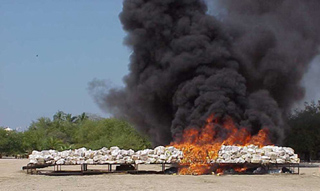
Cocaine seized aboard The Macel ship in December 2001 totaled 9,291 kilograms. The U.S. Drug Enforcement Administration set the cocaine ablaze to ensure the drug never reached the street. (Image courtesy of the Drug Enforcement Administration.)
Instructor(s)
Prof. Hugh Gusterson
MIT Course Number
STS.062J / 21A.344J
As Taught In
Spring 2006
Level
Undergraduate
Course Description
Course Features
Course Description
This class examines the relationship between a number of mind-altering substances and cultural processes. We look at the relationship between drugs and such phenomena as poverty, religion, technology, inter-generational conflict, colonialism, and global capitalism. We read about the physiological and psychological effects of these substances -- ranging from alcohol to LSD, cocaine and ecstasy -- and ask why different societies prohibit and sanction different drugs. We examine the use of mind-altering substances in a number of "traditional" societies, and follow the development of a global trade in such substances as sugar, coffee, tea, nicotine, cocaine, and marijuana concurrent with the evolution of global capitalism. We look at the use of LSD as a mind-control substance by the CIA and as a mind-altering substance in the 1960's counter-culture, and we look at the rise of Prozac® and Viagra® as popular, if controversial, pharmaceutical products in recent years. Finally, we evaluate America's current drug laws.


